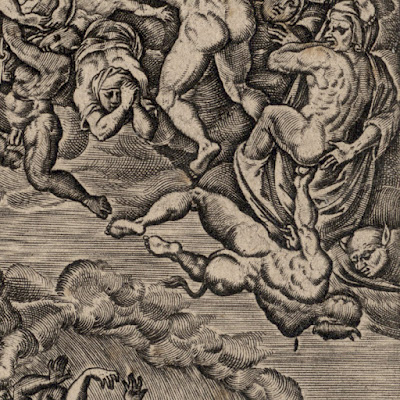Léonard Gaultier (aka Léonard Gautier) (c.1561–c.1635)
“Last Judgement”
after Michelangelo (1475–1564), c.1600
Engraving on
fine laid paper trimmed to the image borderline.
Size: (Sheet)
31.4 x 23.3 cm
Lifetime impression
predating the later state showing the added address of the publisher, Pierre
Mariette I (c.1603-57).
The British
Museum offers the following description of this print:
“Copy after
Michelangelo's Last Judgement, with portrait of the Italian artist in oval
medallion in the upper part” (http://www.britishmuseum.org/research/collection_online/collection_object_details.aspx?objectId=3223684&partId=1&searchText=LEONARD+GAULTIER+&page=1)
The curator of
the BM advises that the image is copied “from the engraving of Martin Rota of
1569 (Bartsch XVI.260.28).”
IFF 17 (XVIIc)
(Inventaire du Fonds Français: Bibliothèque Nationale, Département des
Estampes, Paris, 1930)
Condition: a
richly inked and crisp lifetime impression trimmed to the image borderline in marvellous
condition (i.e. there are no tears, restorations, holes, abrasions or significant
stains beyond light age-toning appropriate to a print that is more
than 400 years old).
I am selling
this exceptionally rare lifetime engraving of Michelangelo’s “Last Judgement”
before the painting was censored with garments to obscure the figures’ nudity for
AU$569 in total (currently US$435.70/EUR387.83/GBP337.36 at the time of posting
this listing) including postage and handling to anywhere in the world. If you
are interested in purchasing this museum etching in superb condition, please
contact me (oz_jim@printsandprinciples.com) and I will send you a PayPal
invoice to make the payment easy.
This print has been sold
This is an
exceptionally rare print! Not only is it a lifetime impression of Gaultier’s
print before the later edition where the publisher’s name, Pierre Mariette I
(c.1603-57), is inscribed on the plate, but the condition of the print is
outstanding (i.e. there are no tears, restorations, holes, abrasions or significant
stains beyond light age-toning appropriate to a print that is more
than 400 years old).
From a personal
viewpoint, what is magically interesting about this print is that it shows many
of the figures in Michelangelo’s famous fresco in their full nudity—before the
censors of the time had the offending bits painted over. Perhaps even more
exciting is that the composition itself is different to the final painting’s
arrangement. In short, this is a historically important and seldom seen treasure.







No comments:
Post a Comment
Please let me know your thoughts, advice about inaccuracies (including typos) and additional information that you would like to add to any post.